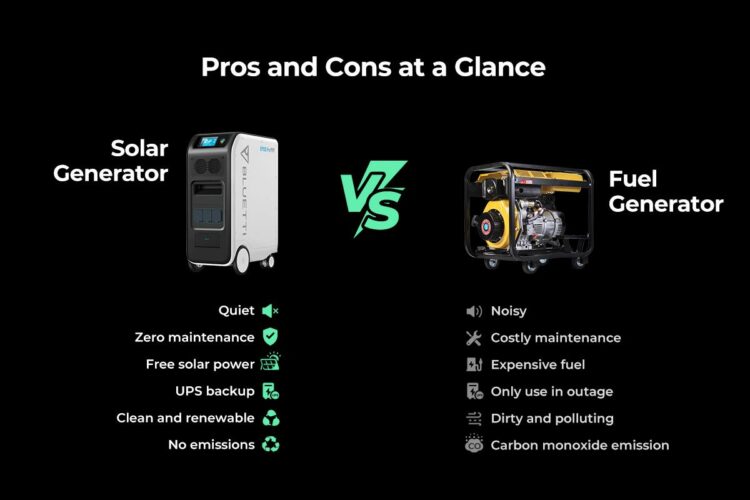Making the Right Choice for Power Outages and Outdoor Adventures: Solar or Fuel Generators?
Generators play a crucial role in providing power during emergencies, such as power outages, and ensuring a reliable power source for outdoor activities. When considering the right generator for these situations, two popular options emerge: solar generators and fuel generators. In this article, a comparison of the two types will be conducted to help in making an informed decision.
How Do Generators Work?
Solar generators harness the power of the Sun to generate electricity. Composed of an inverter, MPPT controller(Maximum Power Point Tracking), battery, and photovoltaic panels(PV), sunlight is converted into usable energy, which is then stored in a battery for later use.
Fuel generators, also known as conventional generators, convert the chemical energy of gasoline into mechanical energy and then into electrical energy. Composed of an engine, alternator, oil tank, and various other moving parts, fuels are consumed to deliver power for instant use.
Comparison Between Solar and Fuel Generators
Safety:
Solar generators are generally considered safer as they don’t require flammable fuels, eliminating risks such as fuel leaks or harmful emissions. However, improper charging can still lead to explosions.
Fuel generators, running on fuels, carry certain safety risks. They emit exhaust fumes and cannot be placed indoors.
Functionality:
Solar generators generally have multiple AC and DC power options for powering modern devices. Limitations may arise when running high-powered equipment or during extended periods of low sunlight.
Fuel generators offer high power output for running larger appliances, yet with limited outlets. Consistent power is provided regardless of weather conditions or time of day.
User Experience:
Solar generators operate quietly and are plug-and-play. Minimal maintenance is required. Additionally, portability is offered in various sizes.
Fuel generators, being noisy, have a complex system that requires regular refueling and maintenance. Steel frames or wheels for toughness and mobility are available, but moving around can be risky and clumsy.
Cost:
Solar generators possess higher upfront costs due to advanced solar and battery systems. However, once installed, free solar energy is utilized, resulting in fewer long-term operational costs.
Fuel generators have lower initial costs but require ongoing expenses for fuel, which can become expensive over time.
Sustainability:
Solar generators are environmentally friendly and sustainable as they harness renewable energy from the Sun. No greenhouse gas emissions or contribution to air pollution is produced.
Fuel generators rely on fossil fuels, which are non-renewable and contribute to pollution and climate change.
Choosing the right generator can be simplified by determining power needs and specific application scenarios. Here are two common situations:
Scenario One: Home Backup Power for Power Outages
Living in an area with less frequent disasters but a possibility of a major hurricane or blizzard each year requires preparation to keep essential appliances running during power outages. In this case, a gas generator is the ideal choice, as it’s cheap and required for instant power few times. However, for frequent use, solar generators, such as BLUETTI‘s AC300 and AC500 models, should be considered. These models, aside from 3,000W to 5,000W output, feature a responsive uninterruptible power supply (UPS) function, taking over grid power within 20 milliseconds when a blackout is detected. For prolonged power outages during winter, they can still perform well and provide power for several days. An expandable capacity by adding extra battery packs allows customization of a backup battery system from 3,072Wh to 18,432Wh.
Scenario Two: Mobile Power for Outdoor Activity
Embarking on a weekend camping trip requires a way to charge a phone, power up a portable speaker for some music, and keep a mini-fridge running to store snacks and drinks. Seeking fresh air, quiet and peace calls for the use of solar generators. They offer a range of outlets to plug in devices and utilize solar panels to collect free solar power for use. The market offers many solar generators with excellent capabilities and portability, such as the BLUETTI‘s AC200MAX and AC200P. With 2,000W power and a capacity of 2,000Wh, they create a mobile power hub to enhance outdoor activities.
Conclusion
Choosing between solar and fuel generators requires consideration of specific needs and comparison of the pros and cons of each option. In general, solar generators are a mainstream power source for home backup and outdoor activities. Risks associated with flammable fuels are eliminated, multiple power options are offered, quiet operation is maintained, and minimal maintenance is required. Although they come with higher upfront costs, they utilize renewable energy and have fewer long-term operational expenses. Conversely, fuel generators provide high power output and can run larger appliances, but they come with safety risks, require regular refueling and maintenance, and contribute to pollution and higher future spending.



